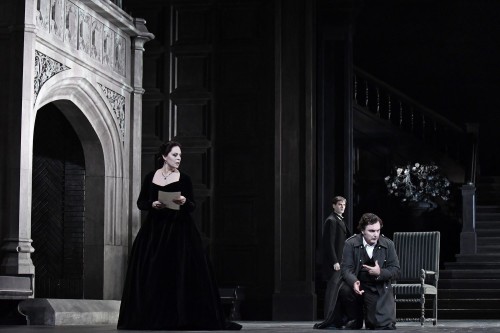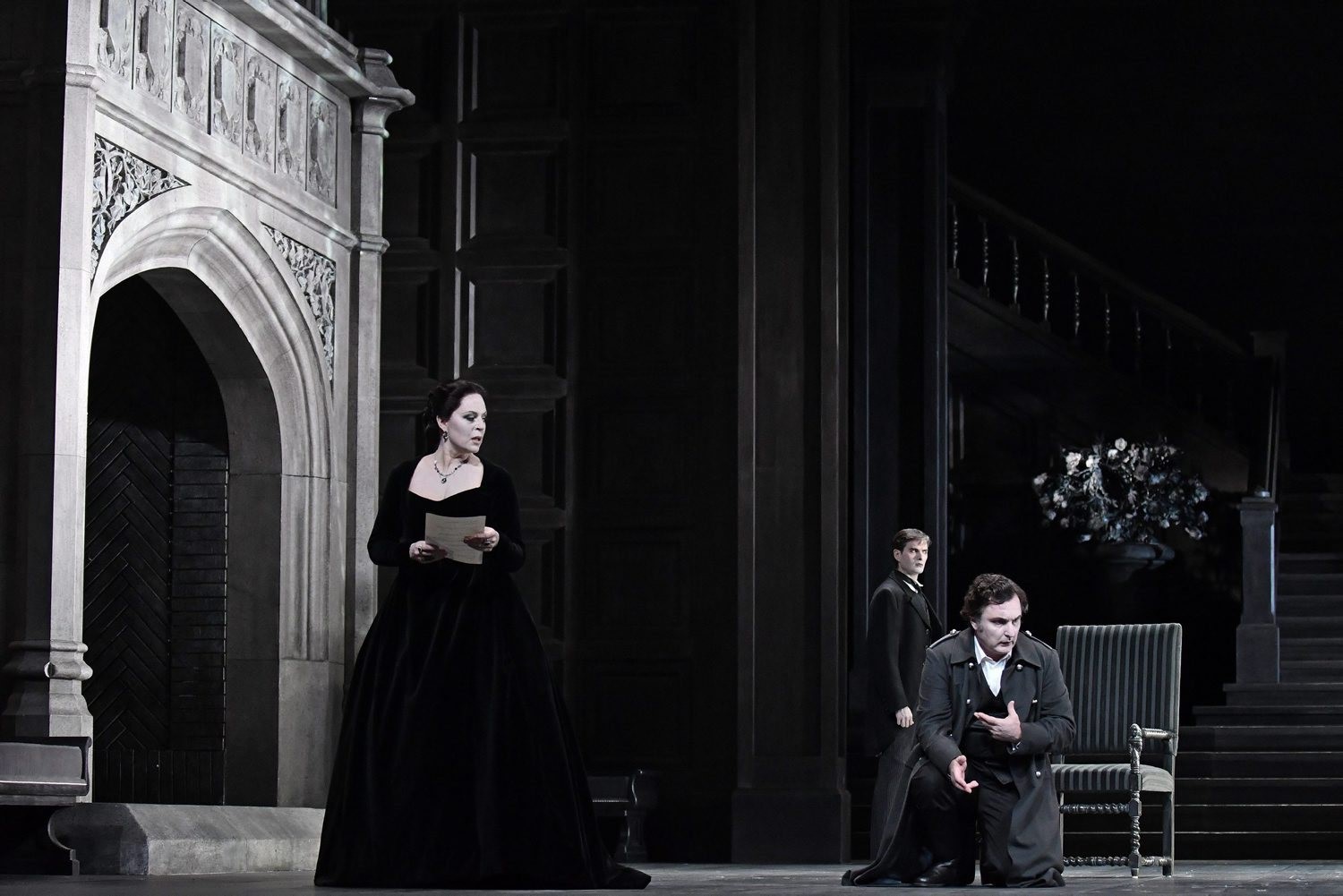 Spain Verdi, Macbeth: Soloists, Orchestra and Chorus of the Gran Teatre del Liceu / Giampaolo Bisanti (conductor), Gran Teatre del Liceu, Barcelona, 10 & 11.10.2016. (JMI)
Spain Verdi, Macbeth: Soloists, Orchestra and Chorus of the Gran Teatre del Liceu / Giampaolo Bisanti (conductor), Gran Teatre del Liceu, Barcelona, 10 & 11.10.2016. (JMI)

Casts:
Macbeth – Ludovic Tézier/Luca Salsi
Lady Macbeth – Martina Serafín/Tatiana Serjan
Macduff – Saimir Pirgu/Teodor Ilincai
Banco – Vitalij Kowaljow/Alessandro Guerzoni
Malcolm – Albert Casals
Lady Macbeth’s Dame – Anna Puche
Doctor – David Sánchez
Servant/Hitman/Herald – Marc Canturri
Production:
Director – Christof Loy (original), Jean-François Kessler (revival)
Sets – Jonas Dahlberg
Costumes – Ursula Renzenbrink
Lighting – Bernd Purkrabek
Liceu is beginning its season with Macbeth, one of the three operas that Verdi composed based upon Shakespeare’s works. This is the 400th anniversary of the latter’s death, and it’s interesting that within a month we’ve had the opportunity in Spain to see all three operas: Falstaff in Corunna, followed by the Teatro Real’s Otello and now Barcelona’s Macbeth.
The stage production by Christof Loy was premiered in Geneva in June 2012. The set, which is spectacular, reminds one of the Manderley mansion in Alfred Hitchcock’s Rebecca. There is just one set for the four acts: a large room with a huge, attractive staircase at the back, which works well in the indoor scenes but leaves something to be desired in the scenes of the witches and Banco’s murder. Both sets and costumes are very attractive and always in black and white, like a tribute to Hitchcock. Here, even the blood is black. The lighting is nicely handled and, as is usual in Loy’s productions, the stage direction is quite good, but the direction of the actors is less satisfactory.
The version used here is the revised and expanded one done in Paris in 1865. It eliminates the ballet and modifies the end, replacing the chorus with the final aria from the 1847 Macbeth.
Giampaolo Bisanti, in his debut at the Liceu, gave a reading that had some good moments, but in general it did not go beyond efficiency and often lacked tension. With the second cast, his tempos were faster and things worked better. The orchestra was not particularly brilliant under his baton, but the chorus was excellent.
Macbeth was sung by French baritone Ludovic Tézier, who was making his debut in the character. In vocal terms, things worked well, especially in the aria ‘Pietà, rispetto, amore’, where he was at his best. But it was apparent that he is not yet familiar with the character, and his overall performance fell short, especially in the recitatives which often lacked intent. I am convinced that he will eventually be a very good Macbeth, but for the moment it’s a character still in the making.
Luca Salsi was Macbeth in the second cast, and he was quite good. His voice is well suited to the part, and he was a more convincing interpreter than Mr. Tezier. Salsi lacks the elegance and nobility of his colleague, especially in the arias, but he was more compelling.
In the first cast, Lady Macbeth was Austrian soprano Martina Serafin, who was also making her debut in the role, although on several occasions she had been announced for the part. Her middle range is attractive, but her top notes are always shrill and shouted. From ‘Vieni, t’afretta’ in the first act to the sleepwalking scene in Act IV, her high notes made one suffer.
Russian soprano Tatiana Serjan was a more convincing Lady Macbeth. Her voice is attractive and well suited to the role, and her top notes were neither shrill nor shouted, including the high D-flat in the sleepwalking scene.
Once again, Saimir Pirgu showed his beautiful voice in the part of Macduff, but I find him too light for the character. Romanian tenor Teodor Ilincai was better suited to the part, though his phrasing leaves something to be desired.
Vitalij Kowaljow was a solid and convincing Banco, while Alessandro Guerzoni was just a comprimario in an important role. It is difficult to understand his presence in this cast.
In the secondary characters, Albert Casals was a sonorous Malcolm. Anna Puche, David Sanchez and Marc Canturri were good in their small parts.
José M. Irurzun
